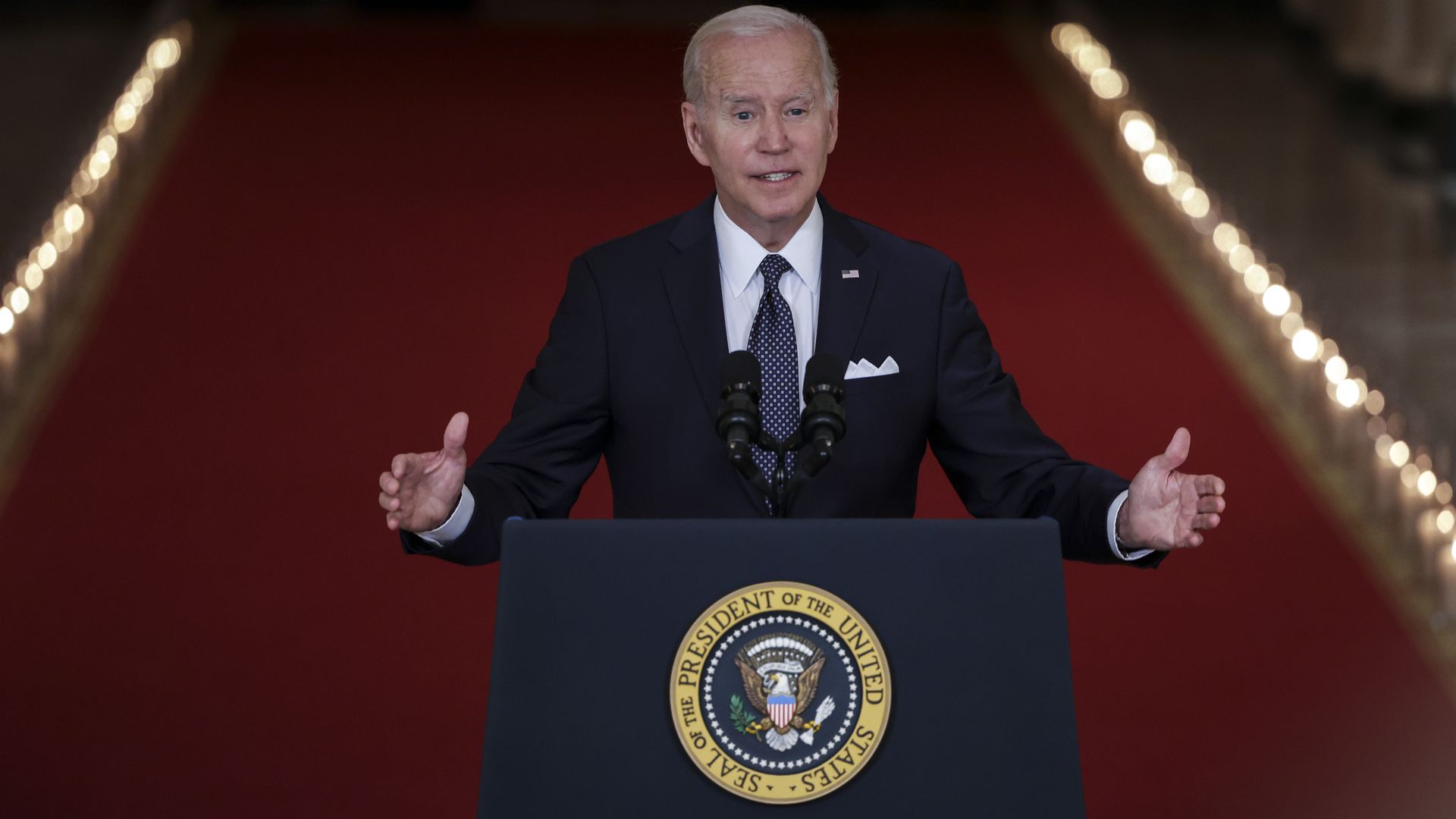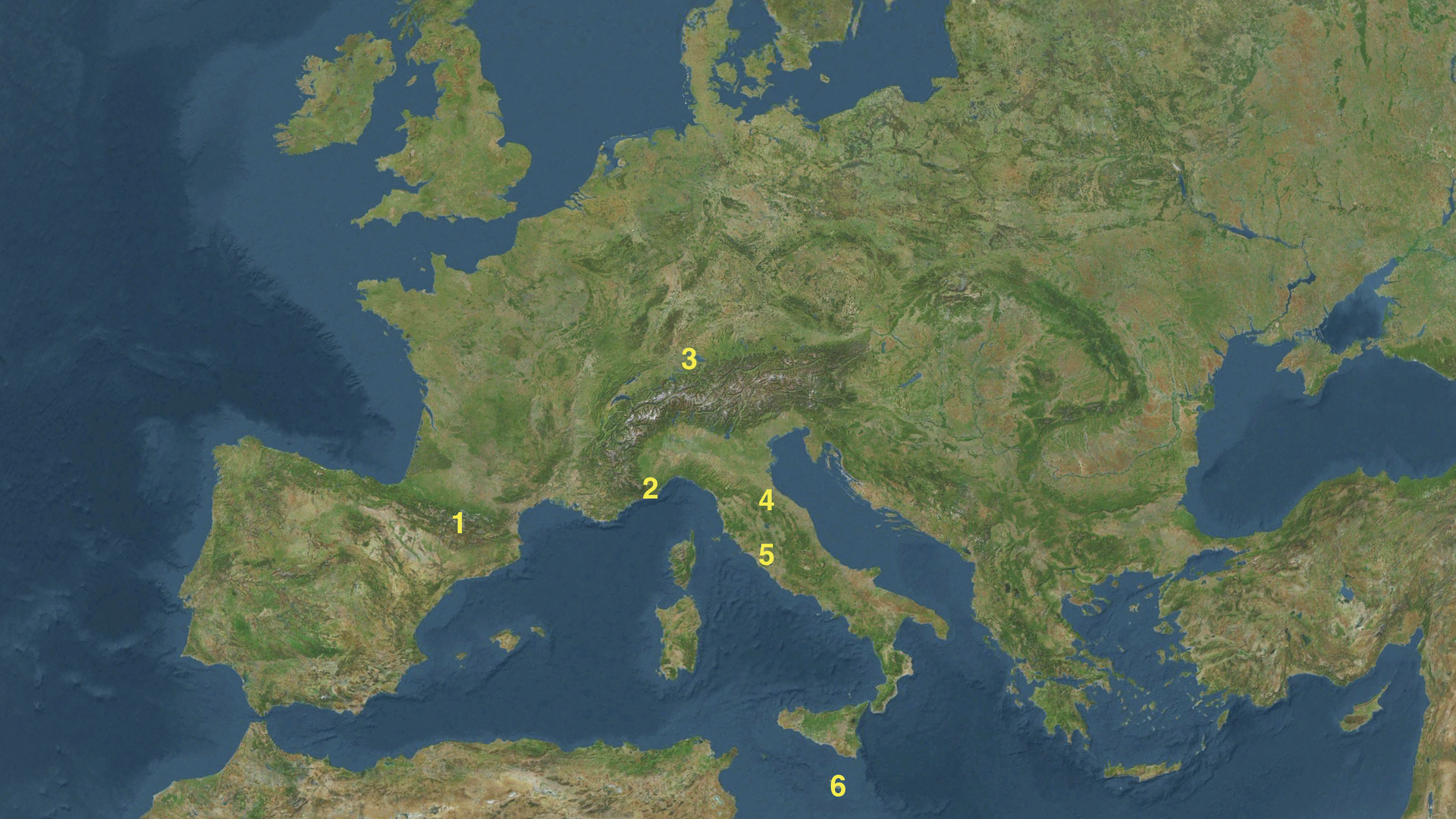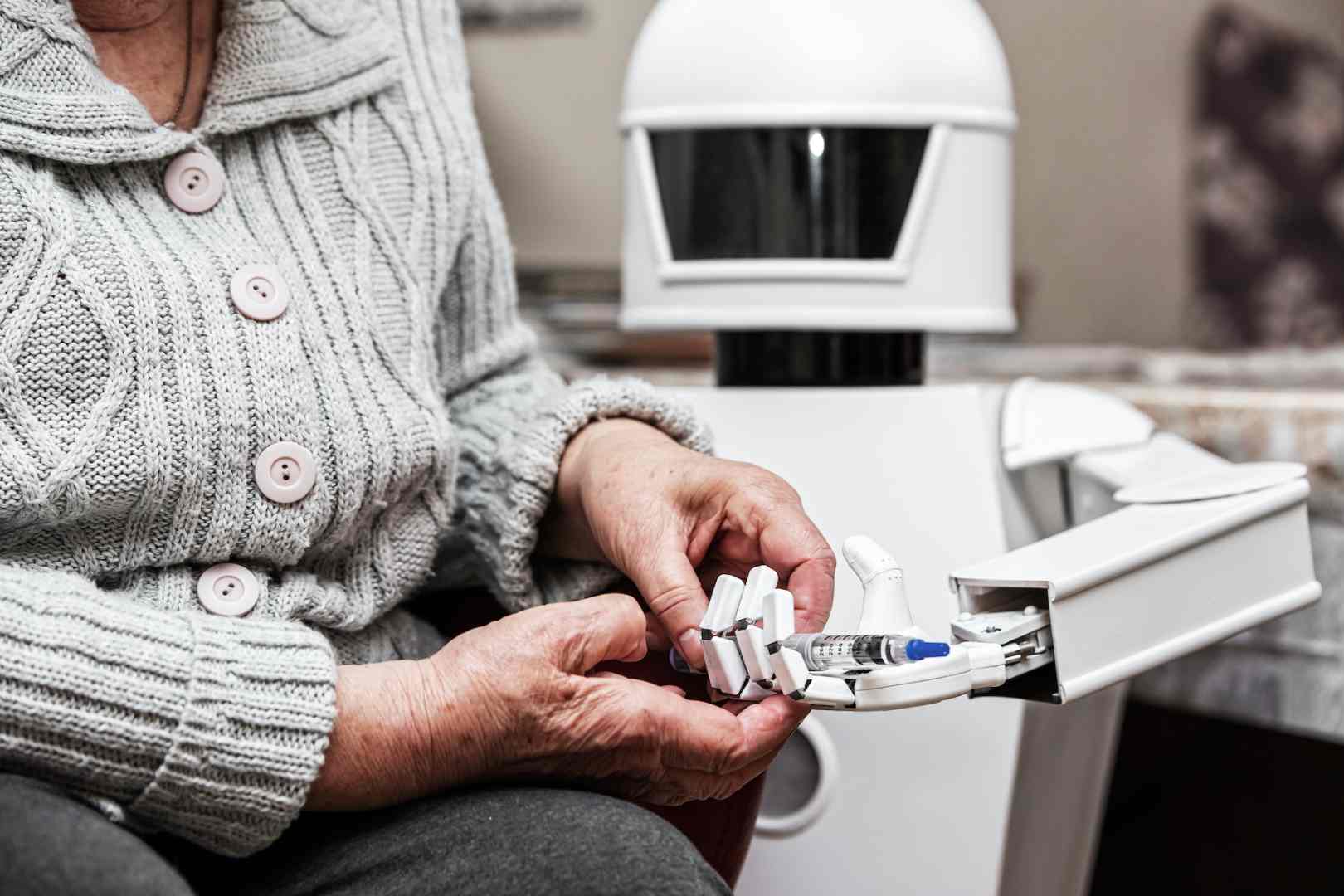| | | | | | | Presented By Stanford Institute for Human-Centered Artificial Intelligence | | | | Axios World | | By Dave Lawler · Jun 06, 2022 | | Welcome back to Axios World. - In tonight's edition (1,896 words, 7 minutes), we've got global food insecurity, Boris Johnson's shaky survival, what Biden will announce at the Summit of the Americas, and more.
New arrival? Subscribe. | | | | | | 1 big thing: Russia's blockade on Ukrainian grain hits Africa hard |  | | | African Union head Macky Sall (left) visits Vladimir Putin in Sochi. Photo: Mikhail Klimentiyev/Sputnik via Getty | | | | Russia's Black Sea blockade is preventing most exports from Ukraine and exacerbating a food crisis in the developing world, particularly in Africa. Driving the news: Secretary of State Tony Blinken accused Russia this evening of "blackmail" and "exporting starvation and suffering." - He claimed Moscow was blocking Ukrainian grain exports and hoarding its own domestic supply in order to generate backlash against Western sanctions.
Senegalese President Macky Sall, the current chairman of the African Union, took a different tone on Friday when visiting Putin, whom he addressed as "my friend Vladimir." - Sall said he received assurances that Russia will "facilitate the export of Ukrainian cereals." He also noted that Western sanctions on Russia has "worsened the situation" by making it harder to buy Russian wheat and fertilizers.
Between the lines: Western leaders see the food crisis as one more reason to condemn Putin. But many African leaders, like Sall and South Africa's Cyril Ramaphosa, are attempting to appeal to him. - African countries are now facing "a witches brew of financial, fuel and food crises" due to drought, the pandemic, and now the war in Ukraine, says Gyude Moore, a fellow at the Center for Global Development and former government minister for Liberia.
- Yes, but: "Since it appears like stifling global grain supplies is a part of Russia's response to the sanctions, it isn't clear that the Africans have enough leverage to sway the Russians from the path they're on," Moore says.
Breaking it down: Last year, Ukraine supplied 11% of the world's wheat exports, 12% of corn exports and 43% of sunflower oil exports, according to the U.S. Department of Agriculture, almost entirely via the Black Sea ports that are now blocked. - Sending grain westward by rail requires reconfiguring railcars at the border to fit a narrower gauge. Meanwhile trucking capacity is limited, and there have been long queues at border checkpoints and nearby ports.
- Thus, millions of tons of grain are sitting in storage, and the backlog will likely grow much larger after the upcoming harvest — all at a time when East Africa is facing famine and food shortages are growing dire elsewhere.
The Kremlin has implied that if the sanctions are eased, it will be more willing to let Ukrainian exports through, leading to the "blackmail" claims. - The sanctions have also made it more difficult for Russia to export grain and, crucially, fertilizers, though those problems appear to be at least partially resolved, per Reuters.
Meanwhile, the U.S. and Ukraine accuse Russia of expropriating grain from eastern Ukraine and exporting it for profit. - The U.S. last month warned 14 countries, most of them in Africa, that Russia could be shipping stolen grain their way, according to NYT.
- Moore says the chances of African countries facing mass hunger turning away cheap grain are slim, particularly with the U.S. offering little in the way of aid.
- He notes that the U.S. scrambled to help Europe find alternatives to Russian gas, but it seems to be doing less to contain the fallout in Africa. Meanwhile, the other humanitarian crises befalling Africa are slipping down the global agenda.
The bottom line: The stolen grain underscores a larger tension in the global response to the invasion: Western leaders want countries to take a moral stand against Russia, but they have their own interests to consider. |     | | | | | | 2. Johnson survives, for now |  | | | Johnson in Downing Street. Photo: Dominic Lipinski/PA Images via Getty | | | | U.K. Prime Minister Boris Johnson has clung on to his job tonight after surviving a no-confidence vote sparked by members of his own party. 148 Conservative MPs voted to remove him, short of the 180 required for a majority. Why it matters: Johnson was found to have broken the law by attending several social gatherings during the U.K.'s strict COVID lockdown. - He'll be further weakened by the revelation that so many within his own party want him gone.
- Still, party rules dictate that he cannot face another confidence vote for a year.
Yes, but: Previous Tory prime ministers, most recently Theresa May in 2018, have failed to keep their jobs for long after facing a confidence vote. - Johnson's standing with the public has also fallen sharply. His approval rating is down to 29% and he was booed on Friday while attending celebrations for the 70th anniversary of Queen Elizabeth II's coronation.
What to watch: The very attributes that won Johnson a landslide victory in 2019 have now become his weaknesses, James Johnson, who worked as May's chief pollster in Downing Street, tells Axios. - "The strongman that voters liked, they now view as weak. The rare politician that they thought they could laugh along with is now seen to be laughing at them. It's very difficult to see how Boris Johnson restores the trust of the people and his reputation regardless of the outcome of this confidence vote this evening," says Johnson, co-founder of polling firm J.L. Partners.
|     | | | | | | 3. Biden to unveil economic partnership plan at Summit of Americas |  | | | Biden speaks from the White House. Photo: Kevin Dietsch/Getty Images | | | | President Biden plans to announce a new economic framework for Latin America on Wednesday, focusing on climate change, worker's rights and supply chains, an administration official and people briefed on the plan tell Axios' Hans Nichols. Driving the news: Biden will outline his "Americas Partnership for Economic Prosperity" plan at the Summit of the Americas being held in Los Angeles this week. - The economic pact will initially be offered to a handful of countries with which the U.S. already has free trade agreements.
- The summit has been buffeted by questions on who will attend, with Mexican President Andrés Manuel López Obrador announcing Monday that he will not participate, citing concerns over the exclusion of leaders from Cuba, Nicaragua and Venezuela.
Why it matters: The president is trying to counter China's growing influence in Latin America by offering regional partners the opportunity to coordinate more closely with the United States on a range of issues. - But the American partnership isn't a traditional trade agreement, where countries lower tariffs to gain market access.
- Several countries in the hemisphere, such as Ecuador and Uruguay, have expressed frustration that Biden has been unwilling to negotiate such agreements.
- The "Americas partnership" resembles in part the Indo-Pacific Economic Framework for Prosperity (IPEF) that Biden announced last month in Asia. While the details and the priorities are different, both focus on establishing common standards to address mutual challenges.
What to watch: Biden also plans to unveil his "Los Angeles Declaration" on migration, which will include countries like Canada and Spain agreeing to accept more migrants. |     | | | | | | A message from Stanford Institute for Human-Centered Artificial Intelligence | | The next frontier in AI and robotics | | |  | | | | Artificial intelligence plays a role in making robots adaptable and autonomous, allowing them to collaborate with and improve the quality of life for humans. | | | | | | Bonus: Where in the world? |  | | | Screenshot via Apple Maps | | | | Today we've got a tricky one. Europe has six mini countries, with tiny areas and populations between around 800 (No. 5) and 500,000 (No. 6). I briefly considered visiting No. 3 while stuck in nearby Zurich. Can you name all six microstates? Scroll to the bottom for the answers. |     | | | | | | 4. Global news roundup |  | | | Atul Gupta in 2011. Photo: Kevin Sutherland/Sunday Times/Gallo Images/Getty | | | | 1. Atul Gupta and Rajesh Gupta, Indian businessman brothers accused by South Africa of conspiring with former President Jacob Zuma to loot the country, were arrested in the UAE today. - South Africa wants to prosecute them for fraud and money laundering. The UAE ratified an extradition treaty with South Africa last year, per the FT.
2. China is building a naval base exclusively for its military in Cambodia, the Washington Post reports citing Western officials. Both countries deny it. - China currently has only one naval base outside its territory, in Djibouti.
3. Voters in Kazakhstan approved constitutional changes in a referendum on Sunday. They include revoking the special powers of former President Nursultan Nazarbayev. - Context: President Kassym-Jomart Tokayev has promised reforms and consolidated power in the wake of an uprising in January that he called a "coup," in part by purging some allies and family members of the former president.
4. Judges in Tunisia began a weeklong strike today after 57 of their colleagues were fired in the latest power grab from President Kais Saied. He dismissed parliament and has been ruling by decree since last July. 5. India's ruling BJP has suspended two spokespeople for comments that drew allegations of Islamophobia from the Organization of Islamic Cooperation, several Gulf states and Pakistan. 6. Bangladeshi officials say a fire at a container depot that killed at least 41 people was made worse because containers holding hydrogen peroxide were mislabeled. When firefighters tried to use water to douse the flames, it caused an explosive reaction. |     | | | | | | 5. 50 dead in Nigeria church attack |  | | | Officials point to blood on the stained floor after an attack by gunmen at St. Francis Catholic Church in Owo town. Photo: AFP via Getty Images | | | | Survivors of yesterday's deadly attack on a packed Catholic church in southwestern Nigeria described scenes of chaos and horror as gunmen began shooting at worshippers who had gathered for mass to celebrate the feast of Pentecost, Axios' Laurin-Whitney Gottbrath writes. State of play: At least 50 people, including children, were killed in the attack on St. Francis Catholic Church in the town of Owo, according to local and international media reports, citing witnesses, hospital staff and a lawmaker. Police have not released an official death toll. Several others were injured. - Authorities are currently searching for the attackers, who police said entered the church carrying guns and explosives and began firing on worshippers inside and outside of the church.
The big picture: The motive behind the attack remains unclear. - Southwestern Nigeria, including Ondo state where Owo is located, has not suffered from the violence over religion seen in states in the northeast, where Islamist extremist groups, including Boko Haram, have waged a bloody insurgency for years, per Reuters.
What they're saying: Steven Omotayo, who lives nearby and rushed to the scene when he heard gunshots, told AP that the attackers were "just shooting." - "If they see anyone trying to escape or stand up, they will just shoot the person," he said. "Everybody standing was bombarded with bullets."
|     | | | | | | 6. What I'm reading: Growing up Stalinist |  | | | A school in Tirana, Albania, in 1990. Photo: In Pictures Ltd./Corbis via Getty | | | | I've had emails asking for book recommendations, so here's a look at the engrossing memoir I listened to last week while walking around Zurich. When Lea Ypi was growing up in the 1980s, her native Albania was a Stalinist, single-party state. - Disappointed that her parents wouldn't hang a picture of Enver Hoxha, the longtime dictator, in their home, she remarked in mixed company that they "don't love Uncle Enver" — leading to a perilous silence.
- Ypi only learned the truth of that remark after the communist system collapsed in 1990 and her parents could at last speak about the brutality of the regime and how it had shaped their own family history.
With the freedom and opportunity of the 1990s also came destitution and civil war. - Ypi, now a professor at the London School of Economics, writes piercingly of the absurdities and contradictions of the Western world that opened up to her when the Iron Curtain came down.
Her memoir, "Free," is told from the perspective of a child. That gives it a dreamlike quality, such as when she describes the most sought-after interior decor item in her neighborhood: an empty Coca-Cola can. - Ypi didn't even know Coca-Cola was a drink, only that displaying a can provided a sense of sophistication.
|     | | | | | | 7. Stories we're watching |  | | | A manicurist plies his trade in Khartoum, Sudan. Photo: Mahmoud Hjaj/Anadolu Agency via Getty | | | - U.S. and South Korea launch missiles in response to North Korea
- Russia strikes Kyiv; Putin threatens "new targets"
- Biden postpones Middle East trip
- U.S.-Saudi thaw won't chill the crude market
- Deglobalization hits the art world
- World's largest known plant discovered off Australian coast
- Ukraine's fairy tale World Cup journey ends in Wales
Quoted: "I'm not going to the summit because not all countries in the Americas are invited, and I believe we need to change that policy that exists from centuries back, of exclusion and wanting to dominate for no reason, without respect of country's sovereignty and independence." — Mexican President Andrés Manuel López Obrador today. |     | | | | | | A message from Stanford Institute for Human-Centered Artificial Intelligence | | How robotics improve the quality of medical care | | |  | | | | The global market for surgical robots is projected to reach $14 billion by 2026. What this means: Stanford scholars are exploring how robotics can improve the quality of medical care — from robot arms for people with disabilities to walking devices that can help prevent falls among older adults. | | | | Answers: 1. Andorra; 2. Monaco; 3. Liechtenstein; 4. San Marino; 5. Vatican City; 6. Malta. |  | It's called Smart Brevity®. Over 200 orgs use it — in a tool called Axios HQ — to drive productivity with clearer workplace communications. | | | | | | Axios thanks our partners for supporting our newsletters. If you're interested in advertising, learn more here.
Sponsorship has no influence on editorial content. Axios, 3100 Clarendon Blvd, Suite 1300, Arlington VA 22201 | | | You received this email because you signed up for newsletters from Axios.
Change your preferences or unsubscribe here. | | | Was this email forwarded to you?
Sign up now to get Axios in your inbox. | | | | Follow Axios on social media:    | | | | | |
No comments:
Post a Comment